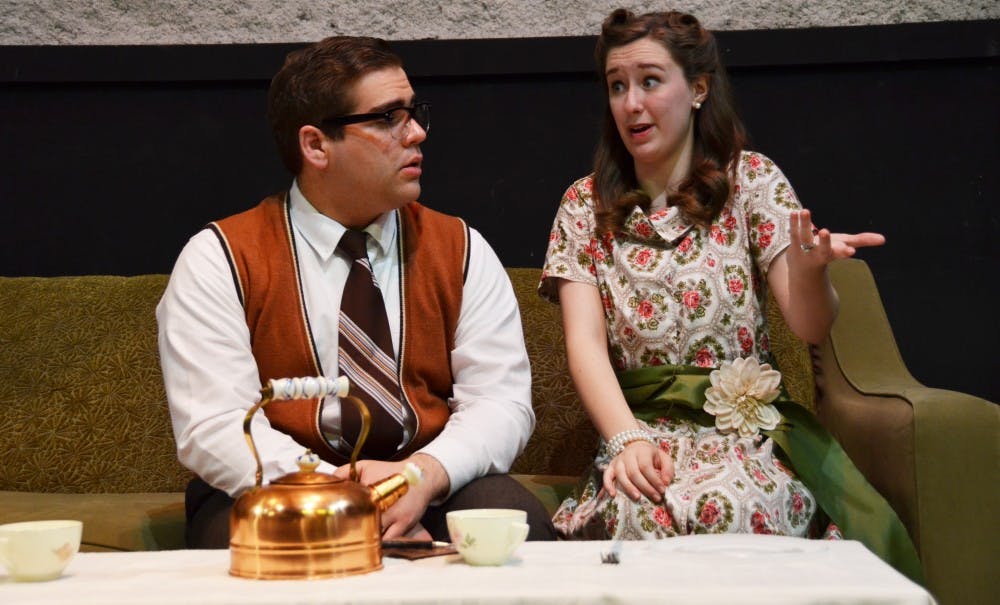What: "One Hand Clapping"
When: 7:30 p.m. on March 24-28 and 7:30 p.m. on March 28-29.
Where: Cave Studio Theatre
Cost: $6
Ball State theatre students present "One Hand Clapping" on Tuesday - the second time a production of the novel-turned-play has ever been shown.
Since the rights to the show were only made available last January, the only other production was the first one directed by the playwright.
Based on the book by Anthony Burgess, the play is centered around Howard and Janet Shirley, a married couple in 1950s Manchester, England.
Daniel Gibson, a sophomore theatre studies major, plays Howard in this production. He describes his character as "very different."
"He was born in the wrong time," said Gibson. "He sees the world around him and wants nothing to do with it. Everything about his time, he hates it—from pop culture to warfare."
Janet, on the other hand, "likes life the way she understands it," according to freshman acting major Kelsey Skomer, who plays her in the show.
Shelbi Snyder, a senior directing major, is the director for this production, and she said Janet "doesn't understand what's wrong with wanting the finer things in life."
Howard and Janet’s problems stem from a lack of understanding.
"Howard talks to Janet about how much he loves the past, and she doesn't get it," said Gibson. "She sees it as a barbaric time, but he sees it as a simpler time."
Skomer said she can relate to her character's curiosity, especially as Skomer adjusts to the acting program here at Ball State.
"We are both learning to adapt and meeting new people," she said. "I can relate to her wanting to understand the world around her."
Having the show take place in the 1950s has challenged the crew to create unconventional lighting designs. One scene takes place in a game show from the TV's perspective. The crew had to create a black-and-white environment through the use of lighting and costumes.
The show’s script often utilizes direct audience address with the lines. Because this is Skomer's first production here at Ball State, adjusting to both the professional environment, as well as the different dialogue style, has been an added challenge, but one she said she sees as an opportunity to grow as an artist.
"It's been an absolutely incredible challenge and an incredible learning experience," she said.
The show takes place in Manchester and like other plays set in foreign locations, the director wanted to utilize dialects; however, their plan to have a trained dialect coach fell through. Snyder decided to learn the subtle differences between the Manchester and the London accents herself and then teach them to the actors.
"I had to learn how sounds work, how people's pallets are shaped differently in different parts of the world, and how to teach my actors how to use different parts of their mouths," she said. "The biggest challenge is that whenever people think about British accents, they think Harry Potter, and that's not what these accents are."
Another challenge for the actors has been toeing the line between comedy and tragedy. Because this show is considered a dark comedy, the play also features a lot of satire and uncomfortable, yet hilarious, moments.
"For the majority of the show, there are these moments where the audience will think, 'That's funny but also uncomfortable... I don't know if I should laugh,'" said Snyder, "and that's a good thing—we want to make you uncomfortable like that. Comedy shows up where you least expect it."
At the end of the play, the cast and crew will be taking donations for the Motivate Our Minds group which encourages and prepares at-risk students in grades first through eighth for success in school.
"They teach students how to be a positive impact on their environment, especially when they have a negative environment which can prevent them from learning," said Snyder. "That really reflects how Howard feels, that people have stopped caring for their environments and about learning, so the group really connects to our play."
|
What: "One Hand Clapping" When: March 24-28 at 7:30 p.m. and 28-29 at 2:30 p.m. Where: Cave Studio Theatre Cost: $6 |





